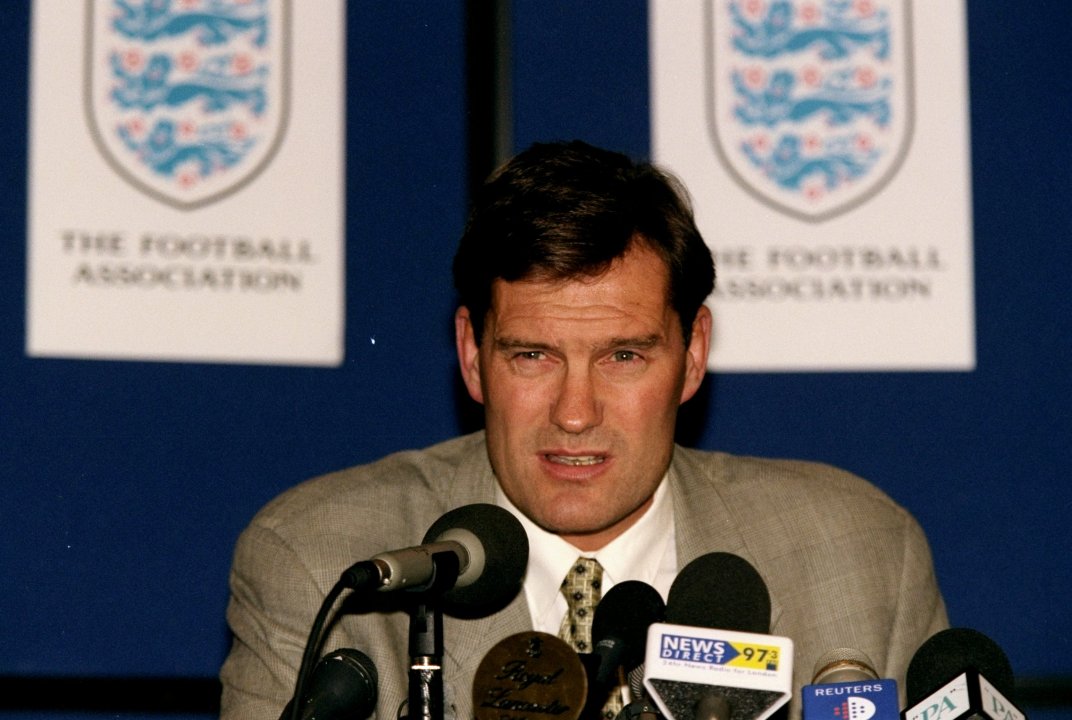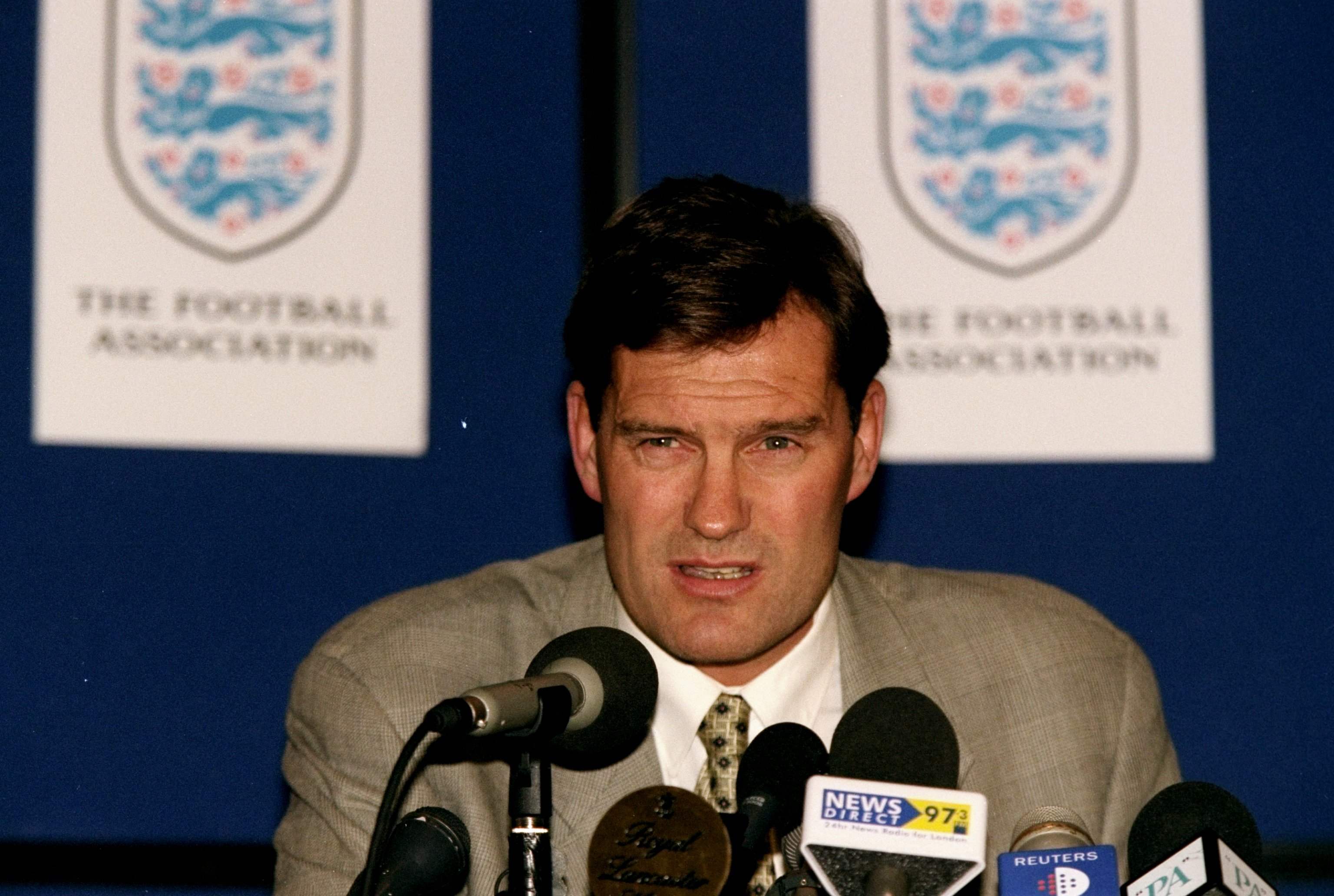Most England managers lose their jobs over bad results: Roy Hodgson was sacked after being humiliated by Iceland, Graham Taylor for losing a must-win qualifier against Holland, Kevin Keegan quit after a bitter home defeat to Germany. There have been exceptions, though: Sam Allardyce went for bragging to an undercover reporter how he could do certain favours for a hefty fee, Fabio Capello after a row with the FA over John Terry’s captaincy when accused of racism, Don Revie defected to take UAE oil money.
The episode seems to have foretold an imminent shift in our culture
But Glenn Hoddle remains unique among England managers – possibly among any football manager anywhere ever – for having been sacked over a theological issue. This strange episode unfolded 25 years ago. Since his playing days, Hoddle had stood apart as a born-again Christian when the norm for footballers remained the George Best booze-and-birds lifestyle. But his religious beliefs didn’t excite much wider interest until he took over the England team. And then they did, particularly because – as well as the usual coaching staff – Hoddle began introducing to squad sessions… a faith healer.
He had known Eileen Drewery since he was 17 and credited her with having once helped him make a miraculous recovery from injury. And he believed she could help his players by performing other miracles. The sudden presence at England training of this quasi-religious figure saw the tabloids nickname his team ‘The Hod Squad’.
In his first and only major tournament, the World Cup in France in 1998, Hoddle took some bold decisions: dropping Gazza, the modern George Best, on the eve of the tournament after he was seen out drinking and eating kebabs, then deciding mid-tournament that he would give Michael Owen a starting role despite him being just 18. Owen performed explosively and the team looked genuinely exciting in their knock-out tie before David Beckham’s moment of petulance saw him sent off and the more robust Argentina reined England in. Then, once again, they went out on penalties. Gary Neville later observed: ‘Glenn had asked the staff to walk around the pitch anti-clockwise during the game against Argentina to create positive energy. Sadly, it didn’t do us much good.’
Rather than allowing this setback to derail his plans, Hoddle responded by increasing Drewery’s involvement. But while he may have had faith in Drewery, his bosses were beginning to lose faith in Hoddle as the campaign to qualify for Euro 2000 was soon a faltering one.
Meanwhile, Drewery’s presence in the England camp had led to a greater interest in and scrutiny of Hoddle’s personal belief system. And things came to a head over an interview he had with The Times, in January 1999. Towards the end of their conversation, sports writer Matt Dickinson pivoted from footballing matters to spiritual ones. And Hoddle was drawn to attempting to explain his belief in reincarnation. This happened, he said, so that humans could ‘learn and face some of the things you have done – good and bad.’ Hoddle went on:
You and I have been physically given two hands and two legs and half-decent brains. Some people have not been born like that – for a reason. The karma is working from another lifetime. I have nothing to hide about that. It is not only people with disabilities. What you sow, you have to reap.
Dickinson would later recall his reaction as the interview ended: ‘I remember turning to my wife and saying, “Well, that was weird”… On a journalistic level, I was surprised he had been so offensive and clumsy. But I wasn’t thinking, “I’ve got the scoop” and I certainly wasn’t imagining it would be as big as it became.’
But it did become very big, very quickly. The ‘disabled punished for sins in a previous life’ line appeared on the Times front page and was widely picked up elsewhere. Disability support groups were asked for their reaction – and it wasn’t positive. Hoddle initially insisted that he had been misquoted, then that his remarks had been taken out of context, finally that belief in reincarnation was normal in other cultures – but none of this washed.
As the storm around him grew, everyone piled in, including then prime minister Tony Blair who decreed: ‘It’s difficult for him to stay… yes.’ An emergency meeting of the Football Association executive was convened to discuss Hoddle’s fate. The FA was then based in Lancaster Gate on the northern edge of Hyde Park. On the afternoon of Tuesday 2 February, they booked a conference room at a hotel next door, the Royal Lancaster. I was dispatched to cover it for the Evening Standard where I then worked as a news reporter. It was what we used to call a proper bunfight – a scrum of reporters and cameras – such was the national and international interest. Hoddle’s position, the FA said, had become ‘untenable’. He was toast.
What’s curious, looking back at all this a quarter of a century on, is that the episode seems to have foretold an imminent shift in our culture. It was a sign of a future in which it would become much more common for public figures to find themselves attacked from all sides for a remark to which they hadn’t given much consideration – frequently but not exclusively made on social media – which could blow up from nothing in hours. It would also become normalised in this new age of giving and taking offence for organisations to decide that, in such circumstances, they could and should dismiss a widely criticised employee if – as they would put it today – ‘their values don’t align with our own’.
After the reincarnation furore, Hoddle’s stature never fully recovered. He did well enough in his next role at Southampton to earn a tilt at the Spurs manager job – it was always in the stars as he was one of their own – but like so many before and since, he couldn’t bring success to ill-fated White Hart Lane and was fired after two mediocre seasons.
Following a similarly iffy spell at then Championship-stuck Wolves, his managerial career was over and he became a pundit instead. A heart attack in a BT Sport studio in 2018 almost killed him. But he recovered and continued broadcasting occasionally.
He now lives more quietly, presumably wondering what he will come back as in his next life. The sports minister in 1998, Tony Banks, used to joke that his punishment for the enormous offence he had caused would be for him to be reincarnated as… Glenn Hoddle.







Comments